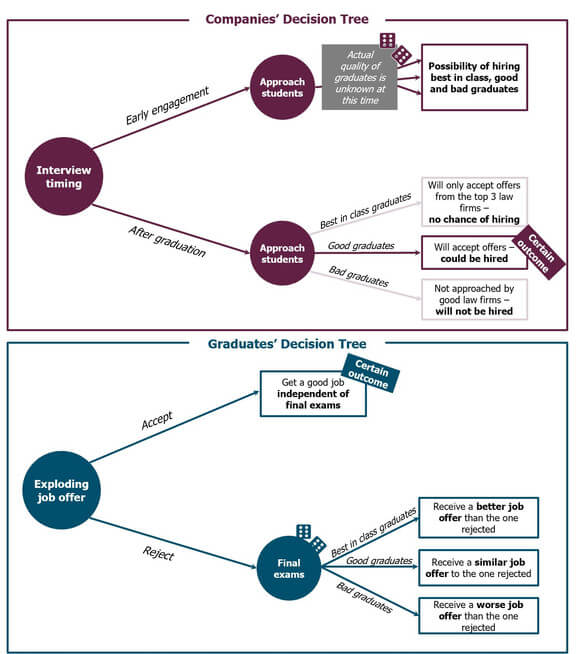A well-functioning HR department is undoubtedly a key driver of successful companies, and deciding whether or not to hire certain candidates is one of their key tasks. However, there is more to interviewing than meets the eye, and some strategic decisions need to be made when interviewing potential employees.
We will investigate two key strategic decisions regarding job interviews that HR departments face, using the methods of game theory for analysis – the timing of interviews and the number of interviews. In this article, we start with looking at what point in time an interview should take place. Read our second article to find out more about how many interviews should take place.
THE TIMING OF INTERVIEWS
We will take the perspective of a law firm in this example. Our law firm is in the top ten, but not within the top 3, of the best law firms in its country, according to some known ranking. Assuming that graduates will join the best law firm they get an offer from, and best in class students will also be identified by the top 3 law firms, it is very unlikely that we will be able to hire the top graduates if we compete in the usual way.
Let’s assume that final exams are taking place in July, and results are published in September. This means that interviews would usually take place in October, so that potential employers can examine the complete CV and scores the graduates have achieved. In this situation, we would expect the best in class graduates to be employed by the top 3 law firms. Our law firm would then employ the next set of good, but not the best, graduates.
GAME THE SYSTEM
However, it would be very valuable for us to have some of the best in class graduates joining our company, and in order to achieve this, we can try to ‘game the system’ as follows:
Instead of interviewing in October, we would bring the interviews forward to June. Inviting the most promising students based on their performance to date, we would make ‘exploding offers’ to these students, such as a job starting straight after graduation. However, the students would need to decide whether they accept the job offer before their final exams in July.
To understand the reasoning behind this shift of timing of the interviews, we have to adopt the perspective of a student. Imagine that you get an offer from one of the leading, established law firms (top 10) before your final exam. You know that you are a very good student and could possibly gain future employment at one of the top 3 law firms, but your exam results are not guaranteed, and they might be not as good as expected. With this in mind, it would be tempting to accept the safe offer by the established law firm, as it may be the best offer you will ever get.
We can therefore assume that a good proportion of students will be risk-averse and accept our exploding offers. Of course there is also a risk for us, the law firm, as some of the students we suspected to become best in class graduates will prove us wrong. Yet this is a risk we are willing to take in order to have the chance of employing the best graduates, which we would not be able to if we had waited until the top 3 law firms sent out job offers as well.

A game-theoretical analysis of a situation always considers the perspective and reasoning of ALL participating players. Therefore, we have to look at the top 3 law firms and how they will be reacting when they notice that some of the best students are hired even before the final exams. If they have the feeling that the pool of promising graduates is thinned out due to the early hiring of competitors, they might also consider hiring students before the final exams.
UNRAVELLING
In order to be ahead of the top-level competitors, we, as one of the top 10 law firms, now have to bring the interviews even further forward, leading to the top 3 law firms also shifting the interviews further ahead of the final exams, and so on. This phenomenon is well known by economists and is called ‘unravelling’.
The consequences can be very unsatisfying, as both the law firms and the students are forced to make their decisions under a lot of uncertainty about their actual preferences. This has led to various legalities being put in place in certain situations, to stop this kind of behaviour. For example, in the market for medicine graduates in the US, it is strictly prohibited for medicine institutes to approach potential employees before a certain threshold day.
THE LEARNINGS
The learnings we can take from this example are two-fold: As a HR department, you must consider not only WHO to interview, but also WHEN. As an authority responsible for such markets, you should consider effects such as ‘unravelling’ that cause these markets to work inefficiently.
In the next article on interviewing, the number of interviews and the implications for different types of companies and candidates will be investigated. As we will see, this is also a much more strategic decision than one might think.
Title image by Business card photo created by yanalya – www.freepik.com
